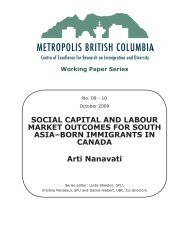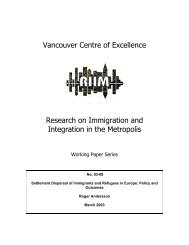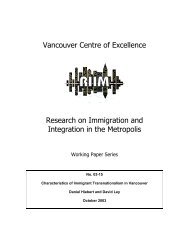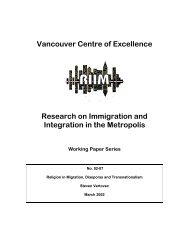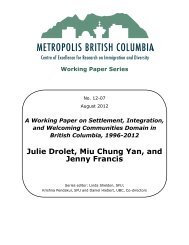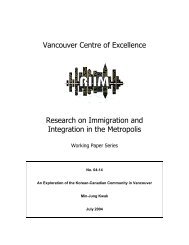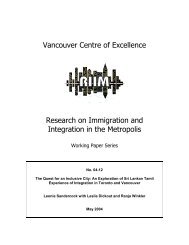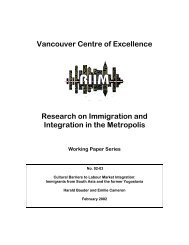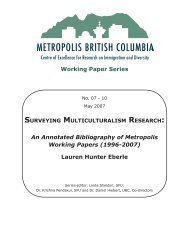Modernization and Global Restructuring of Women's Work
Modernization and Global Restructuring of Women's Work
Modernization and Global Restructuring of Women's Work
You also want an ePaper? Increase the reach of your titles
YUMPU automatically turns print PDFs into web optimized ePapers that Google loves.
19<br />
Drawing upon a twenty-year study <strong>of</strong> a rural community in southwestern Iran, Friedl shows<br />
how women work through <strong>and</strong> negotiate systems <strong>of</strong> power. She attributes women’s relative freedom<br />
to their involvement in non-capitalistic economic activities, which necessarily subverts the publicprivate<br />
divide.<br />
…locally, women are said to “belong in the house,” yet one sees many women out on<br />
apparently legitimate err<strong>and</strong>s, <strong>of</strong>ten all day <strong>and</strong> far from home…a girl is taken out <strong>of</strong><br />
school after the third grade because it is not right for her to be among strangers, but<br />
the next day she is working in an outpost camp in the mountains, in full view <strong>of</strong><br />
women, men, relatives, <strong>and</strong> strangers alike (ibid: 196).<br />
<strong>Work</strong>ing with the Awlad ’Ali Bedouin Egypt, Abu-Lughod (1998) brings to light a premodern<br />
scenario where women were not subjugated to the power <strong>of</strong> the state. She notes that samesex<br />
socialization among kin-based units frees women from male surveillance. Women’s networks,<br />
she observes, provides a milieu for raising children in a way that does not lead to a “molding <strong>of</strong><br />
characters <strong>of</strong> their children, making them industrious, or exposing them to proper stimulation <strong>and</strong><br />
experience” (ibid: 260). Here child rearing is one <strong>of</strong> the many things that women do; they are then not<br />
compelled to raise children as future citizens <strong>of</strong> a proud nation. Women’s roles as wives <strong>and</strong> mothers<br />
are determined not through their dedication to their husb<strong>and</strong>s or to the task <strong>of</strong> raising children but<br />
through their involvement with the affairs <strong>of</strong> their kin <strong>and</strong> <strong>of</strong> the women’s community. A significant<br />
issue highlighted here is that <strong>of</strong> the blurring <strong>of</strong> boundaries between the public <strong>and</strong> the private.<br />
Women’s work in the kin-based arena is as public as men’s work “outside the home.” In the light <strong>of</strong><br />
this research, Abu-Lughod critiques the male-inspired reform program <strong>of</strong> the Egyptian, Amin, that<br />
she considers a plan to convert women into “good bourgeois wives <strong>and</strong> mothers in a world where<br />
state <strong>and</strong> class ties would override those <strong>of</strong> kin, capitalist organization would divide the world into the<br />
distinct sphere <strong>of</strong> private <strong>and</strong> public, <strong>and</strong> women would be subjected to husb<strong>and</strong>s <strong>and</strong> children, cut <strong>of</strong>f<br />
from their kin <strong>and</strong> other women,” (ibid: 261).<br />
As a woman embodying the contradictions <strong>of</strong> modernity, Nadia’s home visits may be read in<br />
the context <strong>of</strong> subjugated knowledge that women continue to acquire because they refuse to forego<br />
the times when “The Story Began Long Ago…” These times are created by women themselves out <strong>of</strong><br />
elements that are both new <strong>and</strong> old. Within the framework <strong>of</strong> non-linear “story time,” issues are aired<br />
<strong>and</strong> new information exchanged: a person’s visit abroad, a health issue, child rearing, women’s<br />
economic activities <strong>and</strong> so on.



